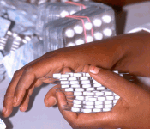|
AIDS as a metaphor for inequality
|

Photo: UN
|
“One stubborn fact was hard to ignore” at the International AIDS Society's annual meeting in Rome last month: the syndrome “remains a metaphor for inequality,” wrote Michel Sidibé, Executive Director of the Joint UN Programme on HIV/AIDS (UNAIDS) and Under-Secretary-General of the United Nations. His words are backed up by new studies on HIV that reveal the persistent gaps between poor and rich countries and between wealthier and marginalized communities in the United States.
Read more
|
Rainforest timber, "the worst thing that money can buy"
Concerns about climate change and about the future of the planet were given the most weight by the readers of Helsingin Sanomat (HS), a Finnish newspaper, when they voted on what they considered to be the most unethical product in the world.
Read more
The future of EU-ACP relations
The European Union (EU) needs the ACP's backing to get support in international governance, and needs its raw materials and markets. But the EU is indecisive about continuing this special relationship, according to Mirjam van Reisen, Europe External Policy Expert. The ACP represents almost half the world's states but does not have a voice in global governance forums, such as the Group of Twenty (G-20), which exclude the poorest countries, noted Van Reisen, founder and director of Europe External Policy Advisors (EEPA), a group of experts on Europe’s relations with developing countries based in Brussels, Belgium, and member of the Coordinating Committee of Social Watch.
Read more
Egypt: Judge threatens women’s rights
A coalition of NGOs protested against threats against women’s rights in Egypt, made under the pretext that alleged “human rights” were in fact a throwback from Suzan Mubarak, deposed president Hosni Mubarak’s wife, and that the country should get rid of everything related to the toppled regime.
Read more
“Early harvest” still green on WTO negotiations
The World Trade Organisation (WTO) could not even agree last week on a small “package” of issues to benefit the poorest countries. This crisis in the WTO is a sign of a larger impasse in international economic cooperation, according to the lastest column written by Martin Khor, Executive Director of South Centre, for The Star, one of the leading newspapers in Malaysia.
Read more
Brazil: Racism still persists
In Brazil infant mortality rates are a very clear indicator of the inequity between different ethnic and racial population sectors. According to the 2009-2010 Annual Report on Racial Inequality in Brazil from the Federal University of Rio de Janeiro (UFRJ), infant mortality among whites is 37.3 per thousand live births but among people of African descent the figure is 62.3.
Read more
Women living in a globalized world
Globalization has contributed to the destabilization and marginalization of women, but has also meant enhanced communications and organization and atransnational connectivity that must be united asorganizations and networks struggle to sustain themselves and maintain resilience in the face of forces that oppose equality. That became clear at Women's World, the conference in Ottawa that marked the 30th anniversary of the Women's World Congress and that brought together nearly 2,000 international activists, academics and policy makers from 92 countries over five days last month.
Read more
International Year of Youth ends without glory
The empowering of young people is becoming a key issue in the speeches of many UN high officers as the International Year of Youth is coming to an end this month. All of them agree that there is much to be done to include young men and women in the development and democratisation processes.
Read more
CELS awarded Gruber Prize for human rights work
The Center for Legal and Social Studies (CELS), the focal point of Social Watch in Argentina, has been awarded the Gruber Foundation Prize for Justice. This annual award has been in existence for ten years; it is given to people and organizations in the human rights field in all parts of the world.
Read more
